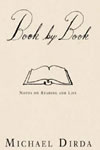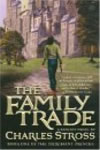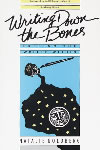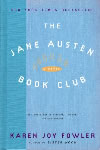Hard Work
Among the pleasant surprises of Michael Dirda's delightful little Book by Book
is its praise for John Clute, whose commentary at Readercon was brilliant.
My stack of reading having toppled onto the printer, I was cleaning my desk yesterday when I came across Clute's review of the first two volumes of The Merchant Princes by Charles Stross in the New York Review of Science Fiction. What fun! He's got a theory: he thinks Stross is up to something, that Stross is playing a very long con. Everything is not what it seems, and there is something we've forgotten. I missed that, and assumed Stross was simply having fun. But of course, a story this large is too much work for mere fun, and Stross has fun with hard work. (You can, and should, subscribe to NYRSF, incidentally.)
This is one of Dirda's best points. Writing and reading are hard work, but each starts with fun. If it's not delighting you, why are you doing it?
It takes a lot to make me abandon a book. A voice in my head keeps telling me to persist, to work through it, not to waste the money. (Hi Mom! Hi Dad!)
But I've bailed on Writing Down The Bones. It was a promising idea: a famous book, read by the author, with lots of the author's candid commentary from ten or fifteen years down the road. I've got a ton of writing to do; I expected a certain amount of pep-talk hooey, but I can use a morning pep talk when it's 100° in the shade, the customers are off having vacation fun, the code is behaving strangely, and you've got 30,000 words to write right now.
It didn't work out. Writing shouldn't be so hard that you need to bribe yourself with chocolate chip cookies. Perhaps you might resort to this sort of trickery occasionally, just as you might -- invoking the shade of your inner undergraduate -- rely on a pot of strong coffee and a bright light to squeeze a few extra hours into the day before a deadline. But page after page of self-trickery, delusion, bargaining: if writing is so obviously contrary to your spirit, perhaps you should consider doing something else.
Some writers read their work well, but Natalie Goldberg is not among them. Her prose voice tends to whine, and when reading she has the unfortunate habit of drawing out the final syllable of nearly every sentence. Rhythm is not her writing's chief grace, and this defect masks whatever rhythm might be found on the page.
So no more bones for now. One of the most delightful sections of Dirda's Book by Book is an extensive list of books with which you might suitably furnish a guest room. Nothing too exciting or enthralling -- your guest doesn't want to embark on a vast new journey, and you don't want to lend a different thriller to each visitor -- but classic mysteries, browsable reference works (ranging from Fowler's Modern English Usage to Clute's Science Fiction Encyclopedia), and at least one Jane Austen. He writes warmly of The Jane Austen Book Club
, and so discussions of Miss Austen have replaced those weary bones to brighten my long commute.



